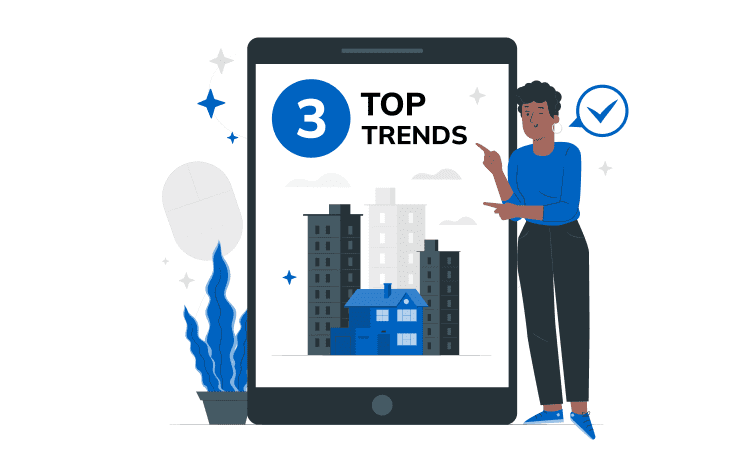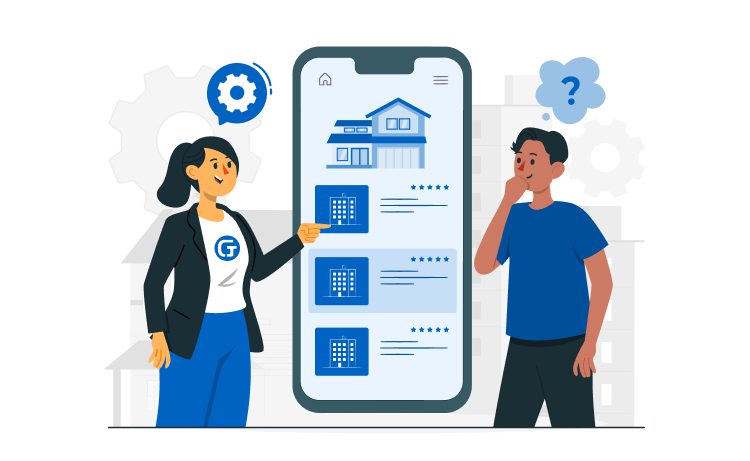
3 Key Tech Trends Transforming the Real Estate Industry In 2025



As with nearly every existing branch of the global economy, the real estate industry was heavily affected by COVID-19. Some of the consequences were to be expected, but some of them turned out to be quite surprising to property managers, investors, and even experienced real estate agents.
Throughout the course of the pandemic, the dynamics of supply and demand regarding the real estate market have fluctuated, with emerging real estate trends, such as virtual tours and advanced real estate software development replacing one another.
Although the future of the real estate industry remains uncertain, statistics show that there are a few trends capable of reshaping the market in the long run.
COVID-19 has changed the way customers approach property viewings and sales in many ways. The inability to arrange real-life property tours seemed to be a rock-solid obstacle in the way of the typical selling process.
Investing in property is a complex process that requires a live presence, with the choice often coming intuitively. Scheduled viewings provide customers with the chance to envision a possible future in their surroundings and gives them the opportunity to feel the property’s ambiance for themselves. When the pandemic began spreading across the world, this standard practice became a luxury and new concepts had to be created in order to keep the sales wheels spinning.
Although technology relating to automation and VR were already commonplace throughout the industry, the pandemic skyrocketed their demand, cementing them as next-year essentials.
Content
In the real estate industry, property deals are increasingly expected to be backed up with data analytics. To make smart decisions regarding property investment, customers need to have a deep understanding of current market trends. Deep data analytics allows for smarter investment decisions, accurate predictions, and sophisticated forecasts.
The use of big data in real estate leads to better decision making, which encompasses everything from choosing convenient tenants to calculating and comparing vacancy rates.
Extracting valuable insights from data volumes is extremely helpful for property and fund managers, investors, and analysts.
Today, more than 95% of property buyers use digital resources to guide them in their decision-making journey, and 44% of real estate buyers initiate their real estate research on the web. This is a massive opportunity to analyze their web behavior to detect buying trends. With big data analytics, you can discover hidden trends within your audience, define their pain points, and home in on what exactly they are searching for.
Furthermore, based on the data, you can create a valuable resource that will guide your prospects through their issues, making you a reliable source of information.
Apart from defining digital habits, big data can be leveraged for the following purposes:
In other words, Big Data is the gold currency of the real estate industry, with promising potential for companies who refine it and use it the right way.
What’s in store for the future, you ask? Adapting new business models, directly built on the back of real estate data.
The thing about the real estate industry is that it already has enormous amounts of information regarding its owners, buildings, locations, etc. Every day, the real estate industry becomes more interconnected thanks to the Internet of Things and other software integrations which increase the layers of accumulated data.
Giant corporations have already begun investing in innovative “smart property” technology, developing in-house software like Alphabet (Nest), Samsung (SmartThings), and Amazon (Alexa). Organizations like Trulia, Redfin, and Zillow obtain and accumulate data by purchasing trends, traffic information, and demographic data to improve decision making for both property investors and buyers.
As data volumes continue to grow exponentially, the next task for real estate service providers is to make use of it. As customer demands continue to grow, it is inevitable that the way people invest in property will also evolve. Minimal requirements and customer expectations will presumably progress, along with the demand to include accurate information about a building’s reliability, conditions, potential malfunctions, etc. Offers lacking specific information and specifications will no longer be relevant.
Apart from better scalability, the growth of big data use will surely reshape the business for property managers and agents. As technology evolves, becoming more sophisticated (along with its users), many functions that real estate agents often perform will most likely become redundant. Instead, real estate service providers will likely become the new partners of property buyers and sellers, as they will be able to satisfy their requests.
The bar of performance is definitely being raised, but efficient use of big data will result in better profit margins, fewer complaints relating to purchased property, and improved forecasting of market conditions.
VR and AR are now widely used in many industries and offer powerful and promising capabilities for reshaping and improving real estate.
Let’s take a closer look at different aspects of the real estate business that can be enhanced with the implementation of virtual and augmented reality.
A decision to invest in real estate is not an easy one, therefore, nurturing real estate leads takes considerable time and effort. That being said, if you can visually impress your potential buyers, there is a higher chance of closing a deal. Visualization plays a crucial role in real estate sales. For this reason, it is critical to add more effort to your visual presentation in order to attract customers.
With this, 360-degree virtual tours are becoming the new norm of the real estate industry. According to Goldman and Sachs, around 1.4 million real estate agents are using VR to showcase properties to potential buyers. Virtual tours not only save time for property funders and real estate investors from remote locations, they also serve as a unique advantage for any real estate company or agent. When your customers see a property inside and out, online, there is a good chance they may proceed further within the buying process.
The luxury property selling platform, Sotheby, has recently announced the ability to virtually tour a property with their own VR headsets. Another real-estate application, Realtor.com, lets users discover critical information about a property, including pricing information, building conditions, and other features, simply by pointing a smartphone at the property.
Not only does virtual reality technology benefit the potential buyer, it also helps with technical visualization and the detection of defective components, which significantly enhances property planning and construction. When combined with digitized building models, augmented reality tools can show otherwise hidden components, like pipes and ceilings. AR also works wonders for architects: an AVRspot app, AResidence, allows you to create architectural models by layering virtual models on existing objects.
Ultimately, the future of VR and AR in real estate is focused on eliminating manual and on-site labor. While these technologies are widely used in the global supply chains because they enable a transparent and integrated logistics process, there is another promising application: teleguidance for remote workers. For instance, augmented reality can allow a technician from a remote location to see and consult issues with the property. Essentially, manual labor in this sector isn’t going to be replaced, but with the help of VR and AR, some operations can be handled digitally.
Just as with big data, there is endless potential for using AI in the real estate industry. The use cases can even include automated applications that match property buyers and sellers to robotic devices for building services.
In sales, smart algorithms are mainly used for filtering data and matching property owners and leasers with investors and funders. There are plenty of real estate startups that develop automation apps. These applications allow potential buyers to monitor market offerings with the ability to set their own requirements.
This way, the property search process is enhanced, increasing the likelihood for agents and sellers to close the deal. For instance, Israeli-based startup, Skyline AI, uses predictive analysis to correctly evaluate property price. Another AI-enabled real estate startup, Trulia, identifies their users’ tastes and offers them properties based on their preferences, including building color, style, price, etc.
The real estate service provider market is expanding and setting the standard for industry players. Although more and more real estate companies will turn to AI-enabled software in order to stay relevant in the market, AI use in real estate is not solely limited to automation apps and software.
This is interesting: read an article about real estate mobile app development.
Depending on the type of property, AI in real estate customer service can be applied through automated virtual assistance. The most manageable case, mainly used for the residential property sector, is chatbots and virtual assistants that help navigate the digital buying process or provide assistance with simple issues.
More complex algorithms of advanced virtual assistants and conversational AI are used in commercial property, like corporate real estate and facility service departments, nursing home operations, concierges, hospitality, etc. This type of software responds to the requests of all stakeholders involved in property management and is able to provide advanced, more sophisticated solutions for emerging issues, like automatically handling technical maintenance requests.
One of the use cases of AI in property management customer service is Deloitte and VIA software. It is a virtual assistant for real estate which is preconfigured with a set of standardized capabilities, which ensures a more efficient property utilization. The system can create service tickets, assist with real-time answers, and launch relevant processes requests.
Ultimately, the dynamics of the real estate industry remains very positive considering the crisis at hand. Although the outcomes and consequences of COVID-19 on the real estate market cannot be completely foreseen, several technological trends are proving to have a surprisingly positive impact in the long run. Companies that are quick to react and adopt real estate technology like big data, VR, and artificial intelligence will lead the market of tomorrow.
It’s a fact — technology will not just alter the real estate market, it will entirely reshape existing business models, creating and paving the way for new ones. These changes will certainly affect manual labor within real estate, and will also change the way property investors approach their purchase process. With large volumes of data being produced every day, the leading positions in the market will be taken over by those who have access to this data and can efficiently interpret it.
In this way, real estate services and software development startups are anticipated to play a crucial role in the transformation of the real estate environment. In the near future, the companies that are able to offer accurate forecasts and sustain the ever-expanding market expectations will be the companies who establish key positions within the sector.
One thing is for sure – innovation is the crucial driver for real estate industry development. Technology such as big data, VR, and AI hold massive potential for optimizing operations, reducing manual labor, and increasing profit margins, and will be widely implemented by real estate companies in 2023 and the upcoming years.








